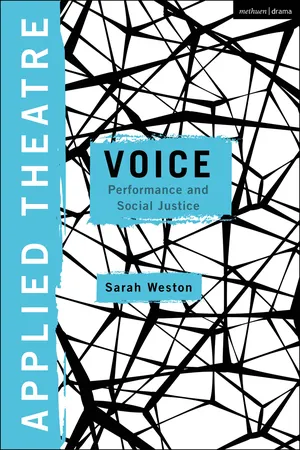
- 225 pages
- English
- PDF
- Available on iOS & Android
About this book
Applied Theatre: Voice is a unique exploration of the conceptual and practical understandings of voice in relation to applied theatre. Voice is fundamental to much practice that takes place in applied and community performance and is regularly the go-to word to articulate community involvement and engagement, be that in terms of creativity, or social, cultural and political activity. Yet often in these references, the preciseness of what we mean by voice is lost. Is voice in applied theatre simply another word for representation, as in 'finding' or 'giving' voice? Or is voice also referring to the material, sonic and embodied phenomenon of human communication, when we consider the relationship between voice, performance and social justice? In this book, voice in applied theatre is critically examined in a range of practical case studies, discussing both its symbolic and material function, demonstrating the necessity of considering both when working in applied and community spaces. In Part One, voice as a concept is introduced, discussing recent theorizations of voice and why they are significant to applied theatre. Part Two introduces the case studies, exploring divergent understandings of why the voice matters in community practice.
Frequently asked questions
- Essential is ideal for learners and professionals who enjoy exploring a wide range of subjects. Access the Essential Library with 800,000+ trusted titles and best-sellers across business, personal growth, and the humanities. Includes unlimited reading time and Standard Read Aloud voice.
- Complete: Perfect for advanced learners and researchers needing full, unrestricted access. Unlock 1.4M+ books across hundreds of subjects, including academic and specialized titles. The Complete Plan also includes advanced features like Premium Read Aloud and Research Assistant.
Please note we cannot support devices running on iOS 13 and Android 7 or earlier. Learn more about using the app.
Information
Table of contents
- Cover
- Halftitle page
- Series page
- Title page
- Copyright page
- Dedication
- Contents
- Figures
- Notes on Contributors
- Acknowledgements
- Part One
- Introduction
- 1 Voice is Ordinary
- 2 Vocal Justice
- Part Two
- 3 Exploring the notion of voice and the ethics of voicing in applied performance: Reflections
- 4 ‘People aren’t going to show up to the revolution if it isn’t fun’: Theatre of the Oppressed and disrupting the tone of voice within deliberative democracy
- 5 Resonant Tails: Creating inter-sensory theatre with children through non-normative voicing, or can the voice without words be enabled to exert political agency?
- 6 The politics of voice and visibility in the Performing Justice Project
- 7 ‘It’s about taking what we understand musically as a kind of metaphor for other moments in our lives’. Discussing Singing as Life Practice – in conversation with Emma Bonnici
- 8 Theatre of the Oppressed as a transnational voice: Building bridges beyond languages
- Index